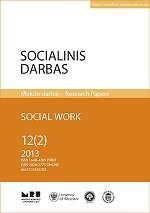„Mes čia – jie ten“. Tarpgeneracinio bendravimo įprasminimas, būdai, vertinimas
“We are here, they are there”. Intergenerational Communication: Giving Sense, the Patterns, Evaluation of the Situation
Author(s): Sarmitė MikulionienėSubject(s): Social Sciences
Published by: Mykolas Romeris University
Keywords: child and parent communication; transnational family; emigration; qualitative survey
Summary/Abstract: The increase of individual life expectancy merges several generations in time, namely, they are coexisting in the same time – so are developing vertical kinship ties. Decline in fertility and birth postponement towards advanced age, in turn, narrow the horizontal kinship ties. Meanwhile, the increase in the intensity of migration progressively separates generations in space. All these demographic processes combined are not only changing the structure of families, but also the social relations among its members. The aim of the research is to reveal what meanings are given by members of transnational families to intergenerational communication. To achieve this purpose, the following tasks were formulated: 1) to reveal what meanings are given to meetings (mutual visits) of different generations belonging to transnational family; 2) to identify how technical tools helping to maintain everyday communication practices in transnational family are perceived; and 3) to describe the evaluation of family’s transnational status and emigration of a family member. Theoretical resources of the study are concepts of transnational family and intergenerational communication. Study’s empirical resources include data of the research project “Trajectories of Family Models and Social Networks: Intergenerational Perspective “(No. VP1-3.1-MES- 07-K-01-106). 60 in-depth individual interviews were conducted in the summer of 2012 in six selected regions of Lithuania (the research included 30 women, 30 men, 15 informants from four birth cohorts: 1950-1955, 1960-1965, 1970-1975, and 1980-1985). The study results showed that different meanings are given to the meetings (mutual visits) of different generations belonging to transnational family: regular visits of children living abroad to their parents is an obligation, tradition; visit of parents residing in country of origin is one of the many activities their children are interested in; transnational family get-together is a tool to make a pleasant surprise for parents; children’s visit to their parents is a tool of parent’s life periodization. Informants perceived meetings of transnational family members as a significant social practice that supports family unity. In order to do common every-day-social-practices in transnational families, at the same time to maintain the integrity of family, an entire arsenal of modern communication technologies is applied: internet programme Skype, telephone, letters, e-mails, messages on Facebook. It seems that the expectations of transnational family members are met in the best way by the internet programme Skype and opportunities of smartphones to convey images. The study revealed specific interpretation of families in transnational condition. The evaluation of families disunited by emigration processes expressed by the informants is solidly negative in cases, when they are reasoning about the transnational family as a unit, and positive-concerned-negative in cases, when they are thi
Journal: Socialinis darbas
- Issue Year: 12/2013
- Issue No: 2
- Page Range: 227-239
- Page Count: 13
- Language: Lithuanian

